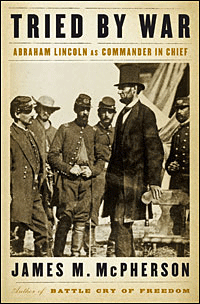 Check out this review of the new James McPherson book, Tried by War: Abraham Lincoln as Commander in Chief, by James Durney on TOCWOC. Astute and valid criticism, I think. McPherson is a fine writer, a synthesizer by reputation, but his choices of what to synthesize seem somewhat pedestrian. While on that subject, here are some thoughts on synthesis from an earlier Robert Bateman article I linked to in this post:
Check out this review of the new James McPherson book, Tried by War: Abraham Lincoln as Commander in Chief, by James Durney on TOCWOC. Astute and valid criticism, I think. McPherson is a fine writer, a synthesizer by reputation, but his choices of what to synthesize seem somewhat pedestrian. While on that subject, here are some thoughts on synthesis from an earlier Robert Bateman article I linked to in this post:
At the outset, a historian examines the available evidence about a historical event or period. He or she looks at the primary sources, be they eyewitness accounts or relevant contemporary documents, and from these develops an understanding of the basic outlines. But what follows next is at the core of the difference between journalism and history. The historian is then expected to interpret these sources to create a framework for a new understanding of the events, which goes beyond a recitation of who, what, when, where and why. This first interpretation, therefore, is the first thesis.
Let us assume for a moment that the historian was the first to address a given topic, and therefore his thesis is widely accepted as it is also the only one available. Time passes. We circle the sun. Children are born, raised, go to high school and learn the thesis (albeit usually in a synopsized version) as a part of their general education. Eventually one of them is masochistic enough to go to graduate school with the intent of pursuing a degree in history.
For the youngster, there are only two real routes available when selecting a dissertation topic. The budding historian might attempt to find a brand new area of study that has never been written about (fat chance there, but sometimes it happens), or he or she can read deeply of the already extant body of historical literature on a topic or period, re-examine the foundational materials underpinning the dominant thesis, perhaps uncover some additional material not noticed before. Then the new graduate student will proceed to offer a new interpretation, different and disagreeing with the original thesis in large ways and small, thus creating the anti-thesis. Obviously, if the author of the original thesis is still around, this might not go over swimmingly. Presuming the young historian has done a good job, his becomes the new “accepted version,” and the pendulum swings.
Skip forward a few more years, and the third phase comes into effect. This time, however, it is usually an older, more experienced and already established historian who completes the cycle. Age and experience have given the older historian some ability to read across multiple interpretations as well as the wisdom to craft his ideas carefully. The senior scholar, recognizing that there are some positive elements in both competing ideas, also brings to bear a much broader understanding of the field overall, and he has time on his side. (He is not living the life of penury, eating macaroni and cheese meals, that young grad student had been.) To this person is left the task of melding thesis and antithesis into a new and greater whole, the synthesis. This, then, becomes the new narrative, necessarily upsetting both the adherents of the thesis and the anti-thesis, but accepted by the larger field as superior to both.
Thus does one cycle of history end. It may have taken five years, or perhaps as many as 50, but at every step there was dispute and criticism flowing from one historian against another. (It’s a dynamic not usually seen within journalism except in the case of egregious acts of ethical violation such as Jayson Blair’s.) The arguing among historians, you see, is very much a part of what makes history.
What is it called when the senior scholar only considers the thesis in his synthesis?
Please take time to read Lt. Col. Bateman’s article. I’ve pointed people to it before, but they can’t seem to get past the historian vs. journalist part of the piece. Particularly at this time of year, what he has to say about historians’ personal biases affecting their analysis of current events is well worth considering.



Recent Comments